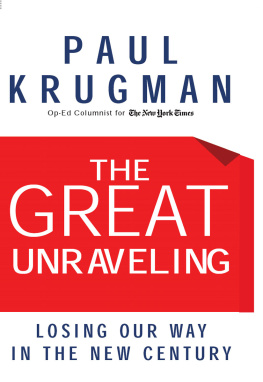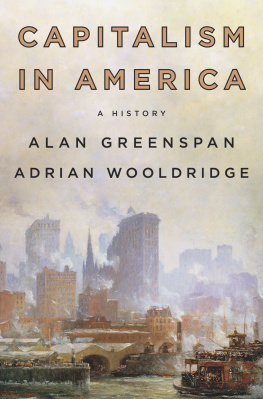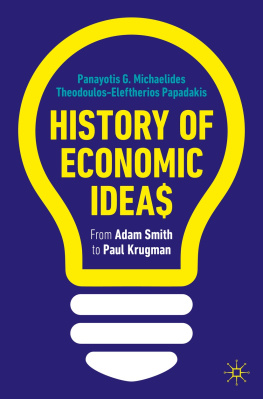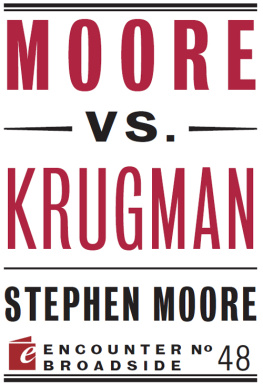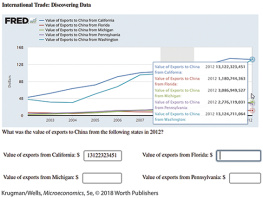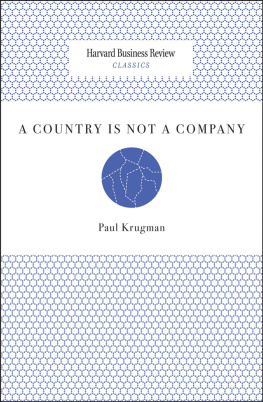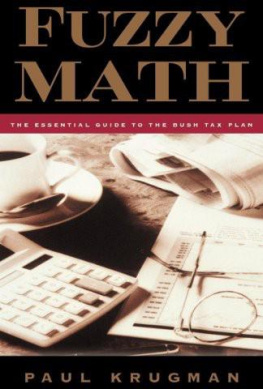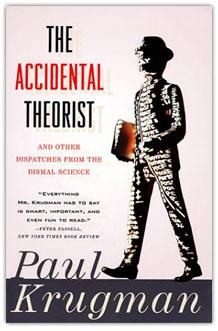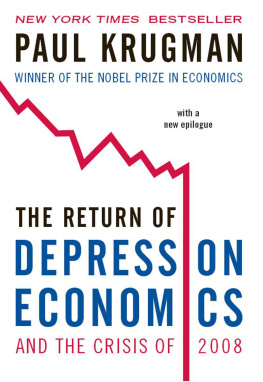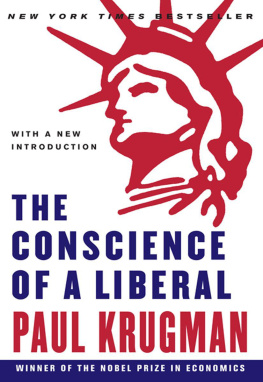The G REAT U NRAVELING
Losing Our Way in the New Century
PAUL KRUGMAN

W. W. NORTON & COMPANY
New York London
The columns on which much of this book is based (except those listed below) originally appeared in The New York Times , and to the extent they are reprinted here, they are reprinted with permission. Inquiries concerning permission to reprint any article or portion thereof should be directed to The New York Times Company, News Services Division, The Times Agency, Ninth Floor, 229 West 43rd Street, New York, NY 10036 or rights@nytimes.com.
O Canada: A Neglected Nation Gets Its Nobel (October 19, 1999) and Enemies of the WTO: Bogus Arguments Against the World Trade Organization (November 24, 1999) are reprinted with permission of Slate . SLATE/Distributed by United Feature Syndicate, Inc.
Seven Habits of Highly Defective Investors (December 29, 1997), Asia: What Went Wrong? (March 2, 1998), The Ice Age Cometh (May 25, 1998), Supply, Demand, and English Food (July 20, 1998), Hong Kongs Hard Lesson (September 28, 1998), Why Germany Kant Kompete (July 19, 1999), and Who Knew? The Swedish Model Is Working (January 25, 1999) are reprinted with permission of Fortune . Time Inc. All rights reserved.
Copyright 2003 by Paul Krugman
All rights reserved
Production manager: Amanda Morrison
Library of Congress Cataloging-in-Publication Data
Krugman, Paul R.
The great unraveling: losing our way in the new century / Paul Krugman.1st ed.
p. cm.
ISBN: 978-0-393-07117-7
1. Economic forecastingUnited States. 2. United StatesEconomic policy2001 3. United StatesEconomic conditions2001 4. United StatesForeign economic relations. 5. Monetary policyUnited States. 6. StocksPricesUnited States. 7. FinanceUnited States. I.
Title.
HC106.83.K78 2003
330.973dc21
2003012060
W. W. Norton & Company, Inc., 500 Fifth Avenue, New York, N.Y. 10110
www.wwnorton.com
W. W. Norton & Company Ltd., Castle House, 75/76 Wells Street, London W1T 3QT
To Robin
Contents
I
BUBBLE TROUBLE
II
FUZZY MATH
III
VICTORS AND SPOILS
IV
WHEN MARKETS GO BAD
V
THE WIDER VIEW
ACKNOWLEDGMENTS
W RITING A COLUMN, especially in difficult times, is a task best not done alone. Luckily, Ive had enormous help.
First, thanks to all the crucial people at The New York Times . Howell Raines and Arthur Sulzberger offered me the job, and persuaded me that it was worth doing; they were right. (And thank God for The New York Times s belief in the principle of a free press, and its willingness to stand by its writers.) Gail Collins watches over me now, and has given me consistently good advice.
Even more important than the bosses, of course, are the people you work with. Most of these columns were copyedited by Steve Pickering, a legend at the Times who has recently gone to a well-earned retirement. If youve never done this sort of thing, its hard to realize how important a copy editors job is. True, some of it consists of youre one line over, what can we cut? But when Steveor Linda Cohn, or Sue Kirby, who also did magnificent work on these columnssays, I didnt quite understand what you said here, its a gentle way of telling you that you need to do some serious revision.
Many thanks also to the team at Norton: Drake McFeely, who has shepherded this authors career over the years; Bob Weil, whose enthusiasm drove this project to completion; and Ann Adelman, another invaluable copy editor. Oh, and Eve Lazovitz, who gently kept my logistics from spinning out of control.
Most of all, my wife, Robin Wells, has been more than a support; she reads every column in draft and is an integral part of the writing process. This is as much her book as mine.
P REFACE
M ETAPHORS CAN BE TRICKY THINGS, but Manhattans debt clock is as good as they come.
A public-spirited businessman installed the clock in 1989, hoping to shame politicians into acting responsibly. Huge numerals counted off the ever-rising national debtever-rising because each year the federal government spent far more than it took in, and was forced to borrow the difference. But in the late 1990s a funny thing happened: the governments tax take soared along with the stock market, and those mammoth budget deficits first shrank, then turned into record surpluses. In September 2000, the owner of the clock pulled the plug.
In July 2002, with the nation once again facing deficits as far as the eye could see, he turned it back on.
Theres much more to recent American history than the way the federal government declared victory in its long struggle against deficits, only to see the red ink quickly return. But as the budget went, so went many other indicators of our national well-being. In the early 1990s we were a depressed nation, economically, socially, and politically: a best-selling book of the era was titled America: What Went Wrong . By the end of the decade we had, it seemed, pulled ourselves together. The economy was booming, jobs were plentiful, and millions of people were getting rich. Budget deficits had given way to record surpluses. The long crime wave that began in the 1960s came to an end; major cities were suddenly, amazingly, safer than they had been for many decades. The future seemed almost incredibly bright.
Then the good times stopped rolling. By 2003, the fabric of our economyand, perhaps, of our political system and our societyseemed once again to be unraveling. The nation was gripped by anxiety, with polls showing a majority of the public feeling that the country was headed in the wrong direction.
This book is, first of all, a chronicle of the years when it all went wrong, againwhen the heady optimism of the late 1990s gave way to renewed gloom. Its also an attempt to explain the how and why: how it was possible for a country with so much going for it to go downhill so fast, and why our leaders made such bad decisions. For this is, in large part, a story about leadershipincredibly bad leadership, in the private sector and in the corridors of power. And yes, it is in particular an indictment of George W. Bush. Helen Thomas, the veteran White House correspondent, has called Mr. Bush the worst president in all of American history. Im not sure about thathe has some stiff competition. But the really terrible presidents of the past led a nation in which presidential incompetence and malfeasance mattered far less either to the nation or to the world than it does today.
Most of this book consists of columns that I wrote for The New York Times between January 2000 and January 2003. I hope that readers will find that the sum is more than the whole of its partsthat taken together these columns tell a coherent story. Ill talk shortly about how I came to write those columns. But first, lets recall the background.
The dreary years
During the late 1990s, as everything seemed to be going rightas jobs proliferated, stocks soared, budgets moved into surplus, and even the crime rate plungedthe dreary mood of the decades early years faded from memory. By 2000, few people remembered the national funk that prevailed in 1992. Yet that funk is essential background to what came later.
If you are one of those people who thinks that national greatness is defined by military success (and such people are running the country right now), the nations foul mood in 1992 may seem puzzling. Militarily, America was on top of the world. Communism had collapsed. A war in the Persian Gulf that many had feared would become another Vietnam turned instead into a spectacular demonstration of American military prowess. We had already become what we remain today, the worlds one and only superpower.

